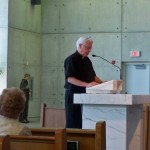In today’s gospel we hear of Jesus calling other people to join him in his work of proclaiming the good news of God’s love for all of us. He calls these men, Peter and Andrew, James and John while they were in the midst of their daily work, Peter and Andrew were casting out nets while James and John were mending their nets – they were all fishermen. Jesus offers them a greater challenge – from now on they would be fishers of people, they would be catching people for God. Jesus began the work of networking, organizing others to help him in his work of proclaiming the good news.
Jesus networked with each one of us when we were baptised. In baptism we became members of the body of Christ, the church. In his letter to the Corinthians Paul compares the union of the human body to the unity of the church. Each member of the body has its own role to play in the life of the body and no one part can do without the other. Each member of the body of the community of the church, of the community of this parish, has his or hers own gifts that are to be used for the good of the whole body, the church, this parish.
I’m sure you heard the words, ‘I have no hands but yours’. These words are meant for every member of the body of Christ, the church. And they are spoken to each of us as we go about the daily tasks of our lives just as they were spoken in a different way to Peter and Andrew, James and John in the midst of casting nets and mending lives.
Christ says to you and to me, as we go about our daily living our ordinary lives, I have no hands but yours, I have no voice but yours, I have no eyes but yours, I have no ears but yours, I have no heart but yours, no feet but yours to continue my work on earth. These words challenge each of us to live no longer for ourselves but for Christ, to complete his work on earth and bring us to the fullness of grace.
Pope Francis say we share our faith by the way we live our lives and you’ve heard that saying of St. Francis ‘ preach the gospel at all times and when necessary use words.
So when we speak we say only the good things people need to hear, word that will really help them. So in our conversations, at home or at work, we speak words of encourage and support and avoid gossip and criticism.
We listen to other people’s problems, knowing they don’t expect us to solve their problems; they just want to be heard. We look at others and see in them their dignity and worth as human beings and as brothers and sisters in Christ. We reach out to others and help them in and through the different ways the parish outreach programs offer us.
Jesus called Peter and Andrew, James and John as they went about their daily work. He calls each of us to be attentive, aware of the possibilities offered in our daily contact with others, at work, at the supermarket, on the street – whenever and where ever we are in contact with other people – there is our chance to be the hands and the ears and eyes of Jesus. This is our opportunity to bring the life and love and healing of Jesus to others.
As baptized Christian Catholics we have to know that Christ’s work of bringing the people to the Father must truly be our own.
 Founded by St. Paul of the Cross, every Passionist takes a special vow to spend his or her energies in promoting remembrance of the sufferings of Jesus, the memory of the Cross, and reflection of the meaning of the Cross for the world.
Founded by St. Paul of the Cross, every Passionist takes a special vow to spend his or her energies in promoting remembrance of the sufferings of Jesus, the memory of the Cross, and reflection of the meaning of the Cross for the world.




